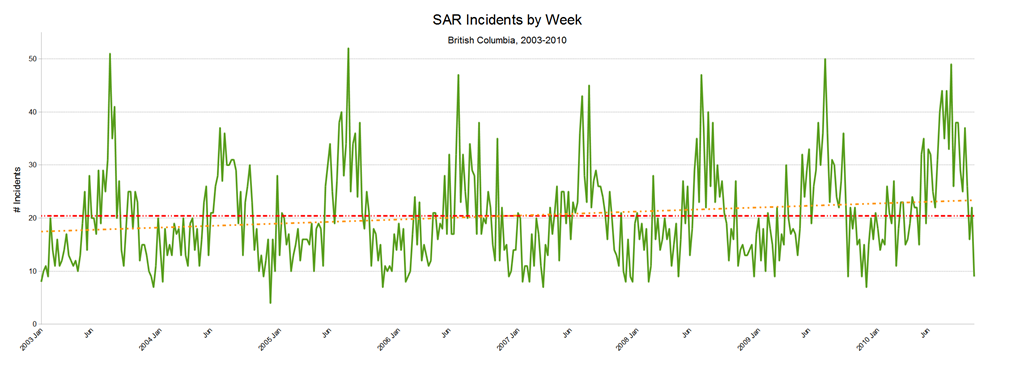What was the largest search in BC History?

The short answer is that I can’t answer that question.
The longer answer is, how do you measure “biggest?”
A few years back I created a BC Search and Rescue information system by reading all of he EMBC Incident Summaries and converting them into a database. I called this project “InfoSAR“. I used this system to create a series of blog posts on the shape of search and rescue in BC, something that has guided my investigations into Search and Rescue ever since.
Highlights of these posts include
- Frequency of SAR incidents in BC: showing the pattern of peak call volumes in summer and winter
- Distribution of SAR Incidents in BC: showing the clustering of SAR incidents in the south west.
- SAR Team call volumes in BC: an analysis of the call volumes of individual teams.
- Comparing SAR Funding in BC: A comparative analysis of funding in relation to call volume in order to understand the disparity in the SAR funding model
I believe that, other than for academic reasons, you can’t address a problem unless you understand the scope, and the only way to do that is to track numbers. While I would prefer to use more detailed statistics, the current “BCSARIS” system, as implemented, does not work this way; it does not allow SAR members or even “officials” to do free text searching on the database. This leaves most of us working in a vacuum, including those that decide where resources might be needed. In the absence of detailed, and available statistics, grave mistakes in resource allocation can occur.
In any case, to the question.
The Largest Search
People
The largest search in terms of the number of people who responded is simple if you consider the time between 2002 and 2012 for which I have certain statistics.
This is the search for a three year old boy from Sparwood BC in 2011.
Over 2100 searchers consisting of 300 Ground Search and Rescue, 85 ESS and 1800 “convergent volunteers” (members of the public) responded to this search over a period of five days. I personally know some of the searchers as they came from every region of BC to assist in the search. The boy was found unharmed.
The next largest search was in 2002 for an 85 year old woman where over 500 ground SAR and members of the public responded.
Time
This one is very hard to answer as the way the stats are gathered it’s not easy to tell how long a task lasts for. Certainly for certain tasks, the SAR team may continue looking for years. Task that I consider to be “long” must exceed 12 days, as I have been invloved in at least one of this length here in southern BC. I am certain there are incidents longer than this and will be happy if someone points one out to me.
Area
This is also almost impossible to answer. I have been involved in two tasks with extremely large areas, sometimes over 1000 km². Both had a common feature however; the subject had planned a long multi-day traverse and was not reported missing for over a week. The nature of these searches means that the subject could have travelled a long distance before getting lost or injured.
Cost
The cost of a search is similarly difficult to estimate. Do you include an hourly cost for the SAR volunteers? In the largest (longest) search I have been involved with, the cost for just helicopter time was in excess of $200,000. I would estimate that the final cost of that search was over $300,000.
Unsatisfactory
I find these answers unsatisfactory for several reasons. As I pointed out in the introduction, I think that SAR people should have access to a database that clearly answers these queries. Right now, this information is incomplete. Some SAR teams have it, some do not. This speaks of disorganization, and disparity. I believe that fixing this issue would have immeasurable benefits to the SAR community as a whole.

I see various requests for this type of information. In the United States, there is no single agency responsible for SAR at the federal level, to mandate this type of reporting to get this information gathered. I think fewer than half the states even gather this type of information. Those that do often do not correlate the data to anything meaningful, leaving it to other interested parties to do the work instead. Interesting post, Mike. Thanks!
Interesting points Mike. There hasn’t been many searches over 12 days in B.C., except where there has been a suspension to allow for a change in conditions, for example the Mt. Elizabeth search in 2002. There has been a number of 7-8 day searches since 2001, which in my mind qualifies as long if that is a consideration but not the longest obviously. Area wise the search for the missing treeplanter along highway 16 in 2002 covered over 5,000km of roadside. Your estimate of the most costly is low…..